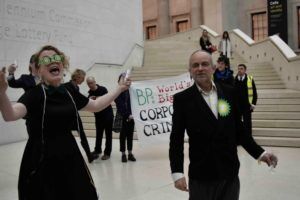

Energy
Campaigners to take over British Museum in “festival of protest” against BP sponsorship
This Sunday 13th September, hundreds of performers and campaigners will take over the BP-sponsored British Museum in a daylong “anti-oil festival”, demonstrating their opposition to oil sponsorship of arts and cultural institutions. Sixteen different campaign groups will join forces and launch a series of performances and actions throughout the day, featuring music, theatre and meditation, and culminating in a mass flashmob inside the museum’s Great Court.
Chris Garrard, a campaigner with Art Not Oil, who are hosting the festival said: “This is our most ambitious intervention to date and shows just how large the movement against oil sponsorship has become. Throughout the day, we’re going to creatively expose how BP tries to hide its corporate crimes and its record on the environment by cynically sponsoring our cultural institutions. The British Museum exists in order to preserve cultures but it knowingly gives legitimacy to a company that is eroding cultures and communities around the world with spills and rising sea levels. With many institutions now divesting and cutting their ties to fossil fuels, the British Museum, the Tate and others need to end their deals with BP or they’ll soon end up on the wrong side of history.”
Art Not Oil is a coalition of arts-based campaign groups, united around the aim of ending oil sponsorship of the arts but for this event will be joined by climate action groups, faith groups, fossil fuel divestment campaigners, artists, musicians, youth campaigners and people working in solidarity with frontline communities impacted by the oil industry. Freedom of Information requests have revealed that BP provides just 0.8% of the British Museum’s annual income, and less than half a percent of the Tate’s. Campaigners argue that these donations are “embarrassingly small” and that BP needs these institutions to cleanse its tarnished brand, following the Gulf of Mexico spill, far more than the institutions need BP’s meagre contributions to their funding.
BP currently has a five-year funding deal with four iconic cultural institutions: The British Museum, the Tate, the National Portrait Gallery and the Royal Opera House. These four sponsorship deals were formally announced in the British Museum at the end of 2011 and that is why the UK’s most visited cultural institution was chosen for Sunday’s “anti-oil festival”. The deal is up for renewal in 2017 and discussions are almost certainly underway with trustees at all four institutions.
This will be the latest in a recent series of high-profile actions and performances from the Art Not Oil coalition. These have included exposing Shell’s influence over the Science Museum’s climate exhibition; a double protest by BP or not BP? at the BP-sponsored Royal Opera House backed up by a critical letter in the Guardian signed by seventy-five composers, musicians and musicologists; ‘Time Piece’, Liberate Tate’s spectacular artistic 25-hour occupation of Tate Modern; and most recently, BP or not BP?’s performance protest against BP funding of the Edinburgh International Festival. Public figures including the acclaimed actors, Simon McBurney and Mark Rylance, and the playwrights Mark Ravenhill and Caryl Churchill, have regularly spoken out against BP sponsorship of the arts.
Evidence has shown that far from being neutral providers of energy, oil companies are using their wealth and political influence to slow down the development of renewables, block clean energy legislation and push up demand for oil and gas. Last month, the Guardian revealed that BP had successfully lobbied to water down renewable energy legislation in the EU. BP is also facing fierce criticism for pushing ahead with locally destructive projects in the Canadian tar sands, the Arctic and the Great Australian Bight. BP was also found to be “grossly negligent” in causing the Deepwater Horizon disaster and was recently fined $18.7 billion over the Gulf of Mexico spill, the largest environmental fine in history.
There have also been more than a dozen anti-oil actions inside the British Museum itself in recent years, including a Culture Beyond Oil performance in 2010; a series of performances by BP or not BP? including the BP-sponsored Shakespeare exhibition in 2012, the BP Vikings exhibition in 2014 and the BP Indigenous Australia exhibition in 2015; and separate interventions by Quaker groups and others.
Stunts, performances and interventions will be taking place all day within the British Museum, concluding with a mass action ‘flashmob’ performance at 3pm. Groups or individuals who wish to take part in the performance are being invited to sign up at the Art Not Oil website (www.artnotoil.org.uk) or by emailing festivoil@riseup.net.


 Features11 months ago
Features11 months agoEco-Friendly Cryptocurrencies: Sustainable Investment Choices

 Energy11 months ago
Energy11 months agoThe Growing Role of Solar Panels in Ireland’s Energy Future

 Energy10 months ago
Energy10 months agoGrowth of Solar Power in Dublin: A Sustainable Revolution

 Energy10 months ago
Energy10 months agoRenewable Energy Adoption Can Combat Climate Change




























